Comprehensive Report: Travel and Tourism Legislation and Ethics
VerifiedAdded on 2020/10/05
|12
|3186
|68
Report
AI Summary
This report provides a detailed analysis of the legal and ethical framework governing the travel and tourism sector. It begins by outlining the legal and regulatory frameworks, including surface, sea, and air transport laws, with a focus on passenger carriage. The report then delves into consumer protection legislation, such as the Trade Description Act and the Package Travel Regulations, highlighting the rights and responsibilities of both tour operators and customers. The impacts of health, safety, and security legislation are explored, emphasizing the importance of a safe environment for travelers. Furthermore, the report examines legislation related to equality, specifically referencing the Equality Act 2010 and its implications for treating all customers and employees fairly. The report also addresses various ethical issues faced by the travel and tourism sector, such as leakage of income, unethical consumer issues, and green ethics, suggesting ways for companies to overcome these challenges. Overall, the report offers a comprehensive overview of the complex legal and ethical landscape of the travel and tourism industry.
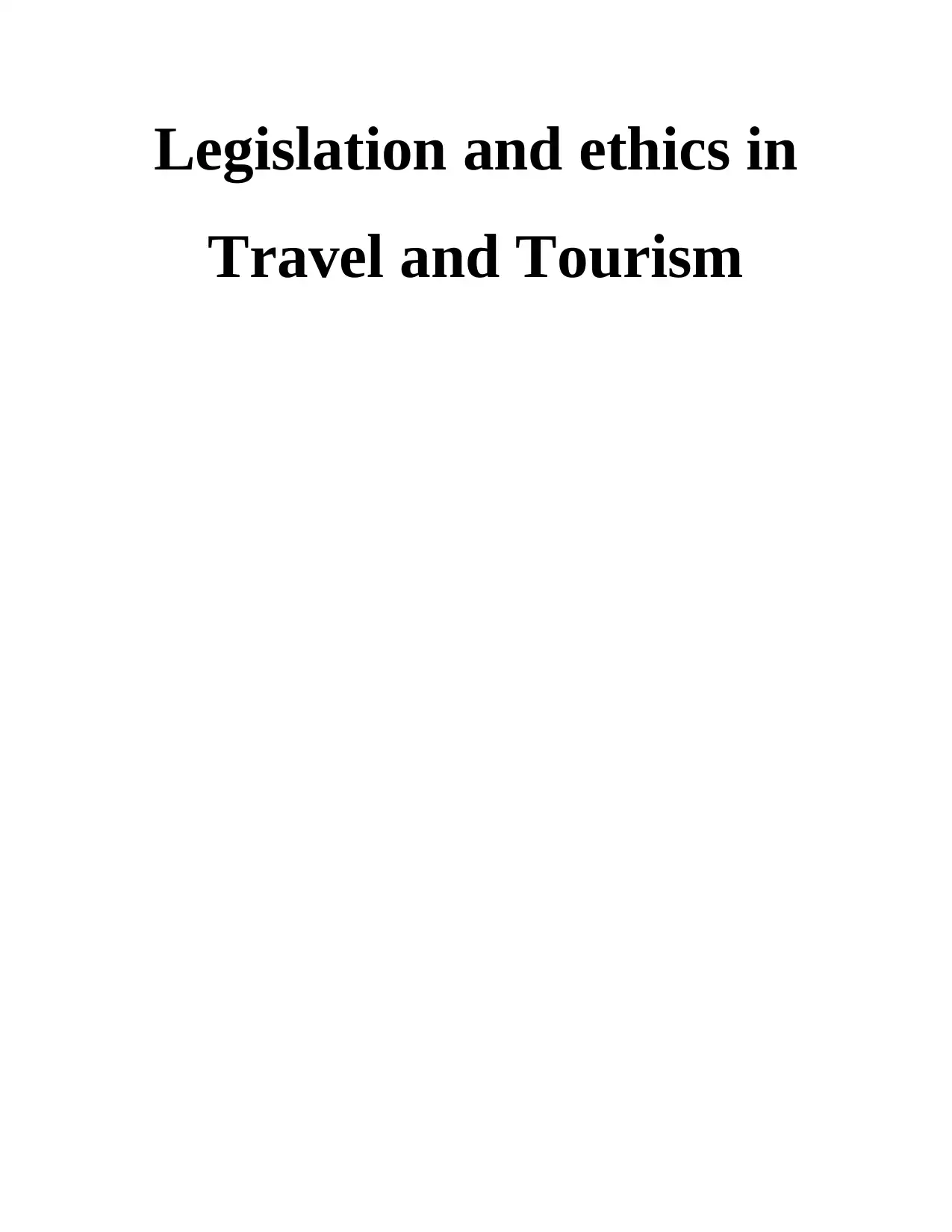
Legislation and ethics in
Travel and Tourism
Travel and Tourism
Paraphrase This Document
Need a fresh take? Get an instant paraphrase of this document with our AI Paraphraser
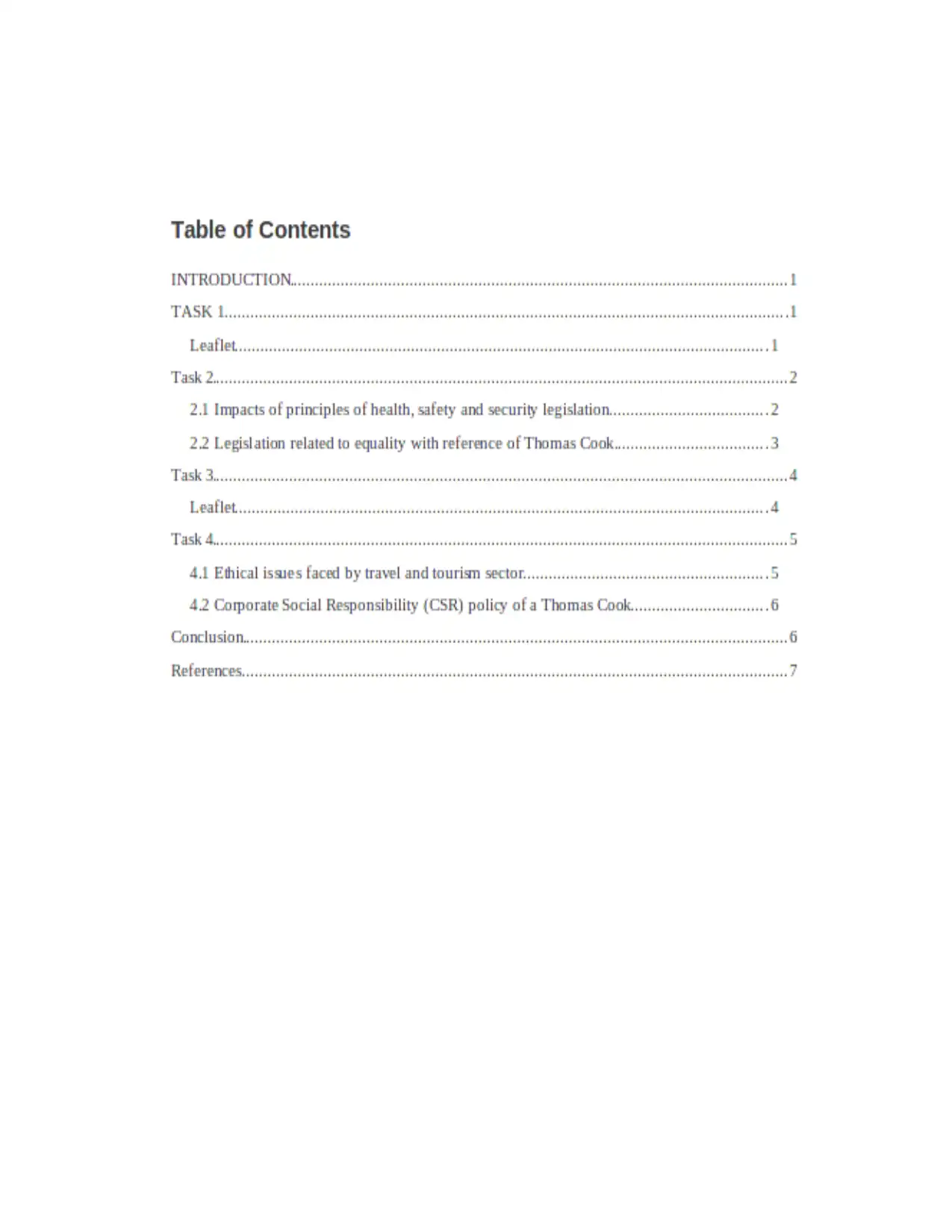
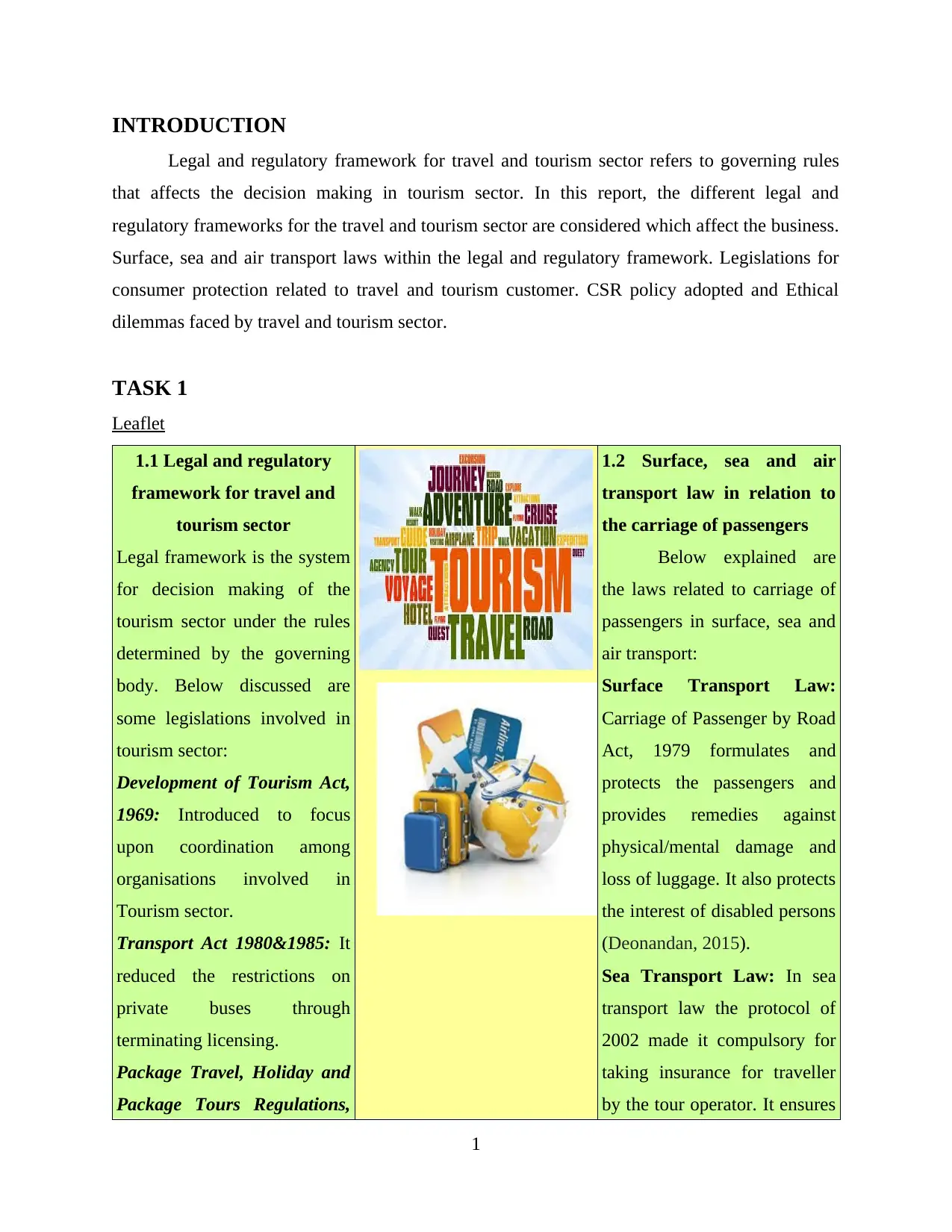
INTRODUCTION
Legal and regulatory framework for travel and tourism sector refers to governing rules
that affects the decision making in tourism sector. In this report, the different legal and
regulatory frameworks for the travel and tourism sector are considered which affect the business.
Surface, sea and air transport laws within the legal and regulatory framework. Legislations for
consumer protection related to travel and tourism customer. CSR policy adopted and Ethical
dilemmas faced by travel and tourism sector.
TASK 1
Leaflet
1.1 Legal and regulatory
framework for travel and
tourism sector
Legal framework is the system
for decision making of the
tourism sector under the rules
determined by the governing
body. Below discussed are
some legislations involved in
tourism sector:
Development of Tourism Act,
1969: Introduced to focus
upon coordination among
organisations involved in
Tourism sector.
Transport Act 1980&1985: It
reduced the restrictions on
private buses through
terminating licensing.
Package Travel, Holiday and
Package Tours Regulations,
1.2 Surface, sea and air
transport law in relation to
the carriage of passengers
Below explained are
the laws related to carriage of
passengers in surface, sea and
air transport:
Surface Transport Law:
Carriage of Passenger by Road
Act, 1979 formulates and
protects the passengers and
provides remedies against
physical/mental damage and
loss of luggage. It also protects
the interest of disabled persons
(Deonandan, 2015).
Sea Transport Law: In sea
transport law the protocol of
2002 made it compulsory for
taking insurance for traveller
by the tour operator. It ensures
1
Legal and regulatory framework for travel and tourism sector refers to governing rules
that affects the decision making in tourism sector. In this report, the different legal and
regulatory frameworks for the travel and tourism sector are considered which affect the business.
Surface, sea and air transport laws within the legal and regulatory framework. Legislations for
consumer protection related to travel and tourism customer. CSR policy adopted and Ethical
dilemmas faced by travel and tourism sector.
TASK 1
Leaflet
1.1 Legal and regulatory
framework for travel and
tourism sector
Legal framework is the system
for decision making of the
tourism sector under the rules
determined by the governing
body. Below discussed are
some legislations involved in
tourism sector:
Development of Tourism Act,
1969: Introduced to focus
upon coordination among
organisations involved in
Tourism sector.
Transport Act 1980&1985: It
reduced the restrictions on
private buses through
terminating licensing.
Package Travel, Holiday and
Package Tours Regulations,
1.2 Surface, sea and air
transport law in relation to
the carriage of passengers
Below explained are
the laws related to carriage of
passengers in surface, sea and
air transport:
Surface Transport Law:
Carriage of Passenger by Road
Act, 1979 formulates and
protects the passengers and
provides remedies against
physical/mental damage and
loss of luggage. It also protects
the interest of disabled persons
(Deonandan, 2015).
Sea Transport Law: In sea
transport law the protocol of
2002 made it compulsory for
taking insurance for traveller
by the tour operator. It ensures
1
⊘ This is a preview!⊘
Do you want full access?
Subscribe today to unlock all pages.

Trusted by 1+ million students worldwide
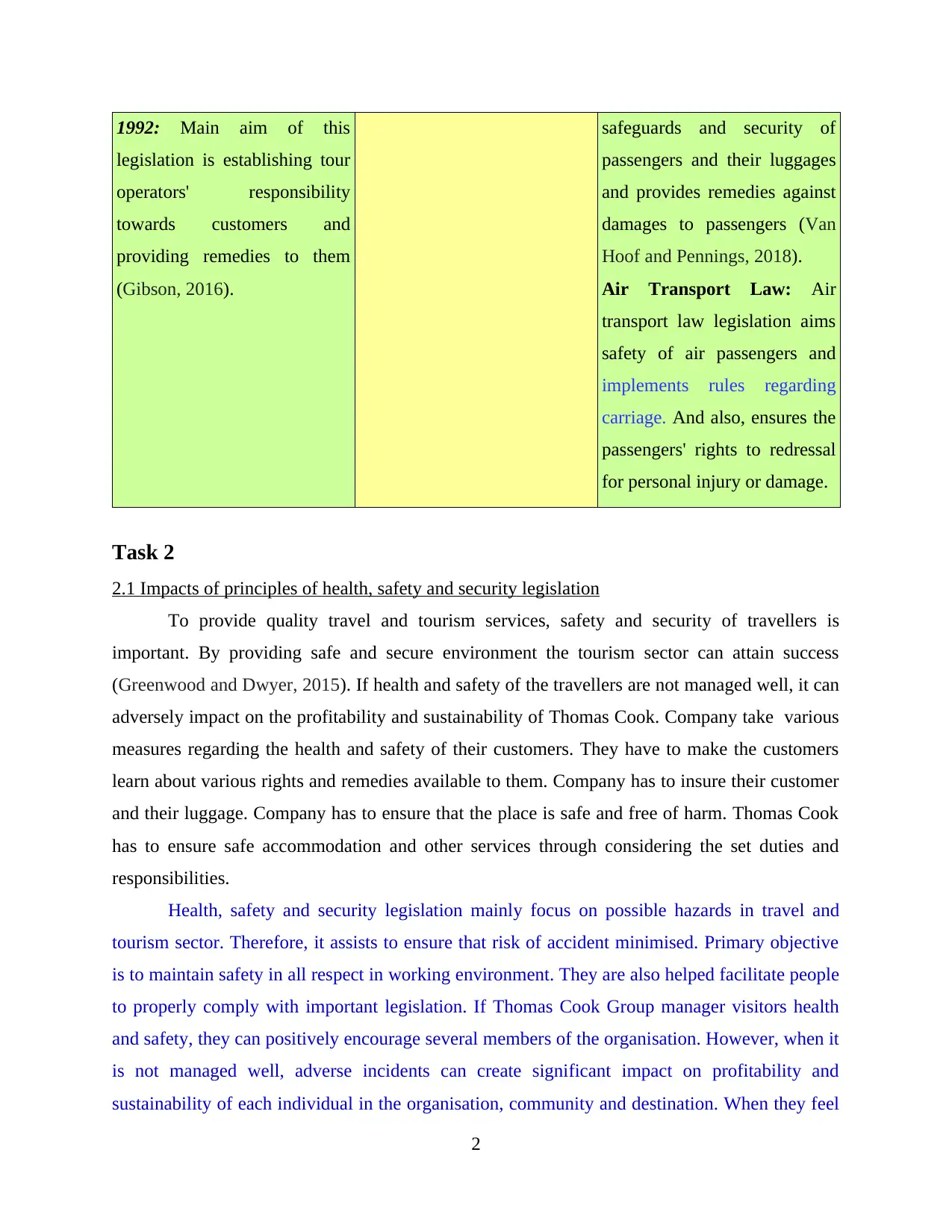
1992: Main aim of this
legislation is establishing tour
operators' responsibility
towards customers and
providing remedies to them
(Gibson, 2016).
safeguards and security of
passengers and their luggages
and provides remedies against
damages to passengers (Van
Hoof and Pennings, 2018).
Air Transport Law: Air
transport law legislation aims
safety of air passengers and
implements rules regarding
carriage. And also, ensures the
passengers' rights to redressal
for personal injury or damage.
Task 2
2.1 Impacts of principles of health, safety and security legislation
To provide quality travel and tourism services, safety and security of travellers is
important. By providing safe and secure environment the tourism sector can attain success
(Greenwood and Dwyer, 2015). If health and safety of the travellers are not managed well, it can
adversely impact on the profitability and sustainability of Thomas Cook. Company take various
measures regarding the health and safety of their customers. They have to make the customers
learn about various rights and remedies available to them. Company has to insure their customer
and their luggage. Company has to ensure that the place is safe and free of harm. Thomas Cook
has to ensure safe accommodation and other services through considering the set duties and
responsibilities.
Health, safety and security legislation mainly focus on possible hazards in travel and
tourism sector. Therefore, it assists to ensure that risk of accident minimised. Primary objective
is to maintain safety in all respect in working environment. They are also helped facilitate people
to properly comply with important legislation. If Thomas Cook Group manager visitors health
and safety, they can positively encourage several members of the organisation. However, when it
is not managed well, adverse incidents can create significant impact on profitability and
sustainability of each individual in the organisation, community and destination. When they feel
2
legislation is establishing tour
operators' responsibility
towards customers and
providing remedies to them
(Gibson, 2016).
safeguards and security of
passengers and their luggages
and provides remedies against
damages to passengers (Van
Hoof and Pennings, 2018).
Air Transport Law: Air
transport law legislation aims
safety of air passengers and
implements rules regarding
carriage. And also, ensures the
passengers' rights to redressal
for personal injury or damage.
Task 2
2.1 Impacts of principles of health, safety and security legislation
To provide quality travel and tourism services, safety and security of travellers is
important. By providing safe and secure environment the tourism sector can attain success
(Greenwood and Dwyer, 2015). If health and safety of the travellers are not managed well, it can
adversely impact on the profitability and sustainability of Thomas Cook. Company take various
measures regarding the health and safety of their customers. They have to make the customers
learn about various rights and remedies available to them. Company has to insure their customer
and their luggage. Company has to ensure that the place is safe and free of harm. Thomas Cook
has to ensure safe accommodation and other services through considering the set duties and
responsibilities.
Health, safety and security legislation mainly focus on possible hazards in travel and
tourism sector. Therefore, it assists to ensure that risk of accident minimised. Primary objective
is to maintain safety in all respect in working environment. They are also helped facilitate people
to properly comply with important legislation. If Thomas Cook Group manager visitors health
and safety, they can positively encourage several members of the organisation. However, when it
is not managed well, adverse incidents can create significant impact on profitability and
sustainability of each individual in the organisation, community and destination. When they feel
2
Paraphrase This Document
Need a fresh take? Get an instant paraphrase of this document with our AI Paraphraser
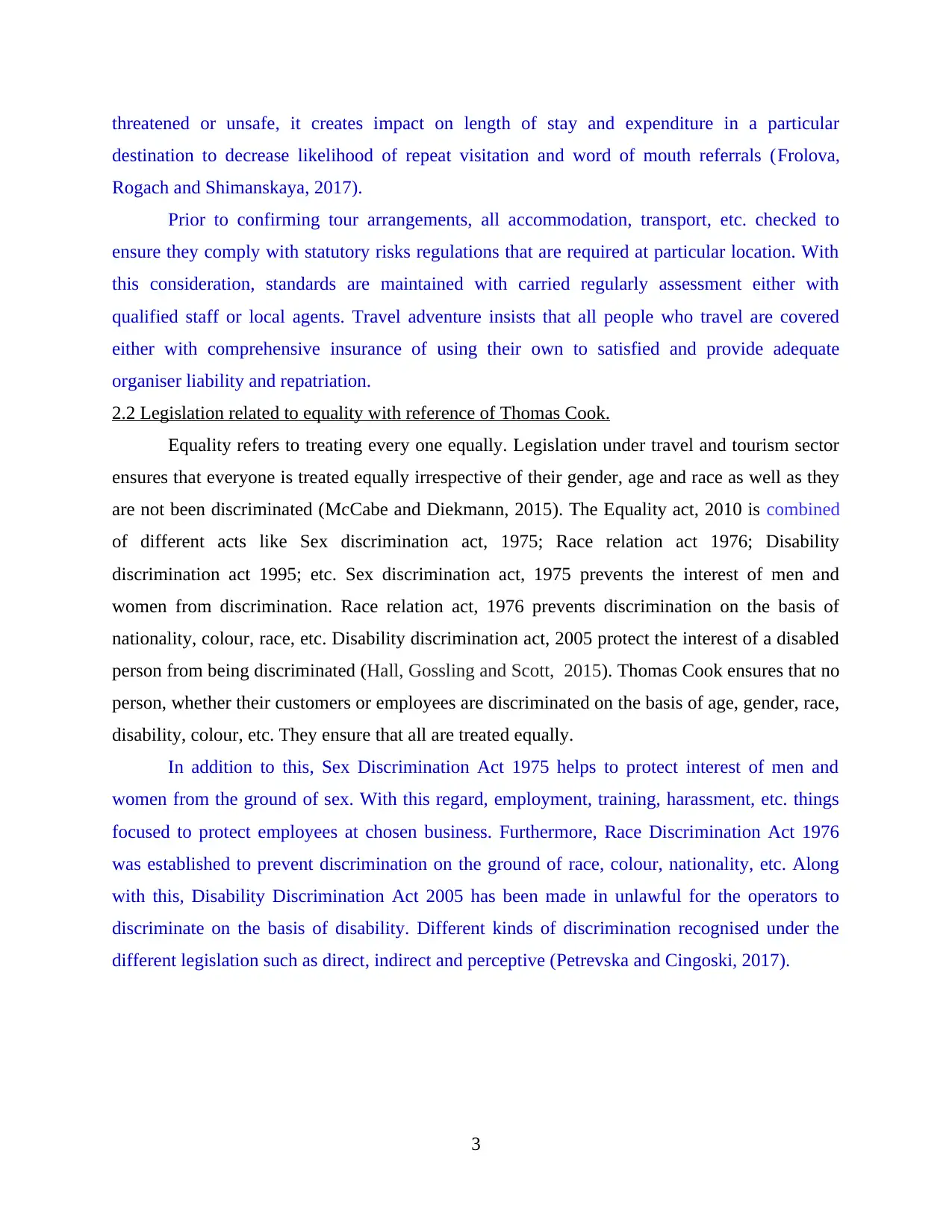
threatened or unsafe, it creates impact on length of stay and expenditure in a particular
destination to decrease likelihood of repeat visitation and word of mouth referrals (Frolova,
Rogach and Shimanskaya, 2017).
Prior to confirming tour arrangements, all accommodation, transport, etc. checked to
ensure they comply with statutory risks regulations that are required at particular location. With
this consideration, standards are maintained with carried regularly assessment either with
qualified staff or local agents. Travel adventure insists that all people who travel are covered
either with comprehensive insurance of using their own to satisfied and provide adequate
organiser liability and repatriation.
2.2 Legislation related to equality with reference of Thomas Cook.
Equality refers to treating every one equally. Legislation under travel and tourism sector
ensures that everyone is treated equally irrespective of their gender, age and race as well as they
are not been discriminated (McCabe and Diekmann, 2015). The Equality act, 2010 is combined
of different acts like Sex discrimination act, 1975; Race relation act 1976; Disability
discrimination act 1995; etc. Sex discrimination act, 1975 prevents the interest of men and
women from discrimination. Race relation act, 1976 prevents discrimination on the basis of
nationality, colour, race, etc. Disability discrimination act, 2005 protect the interest of a disabled
person from being discriminated (Hall, Gossling and Scott, 2015). Thomas Cook ensures that no
person, whether their customers or employees are discriminated on the basis of age, gender, race,
disability, colour, etc. They ensure that all are treated equally.
In addition to this, Sex Discrimination Act 1975 helps to protect interest of men and
women from the ground of sex. With this regard, employment, training, harassment, etc. things
focused to protect employees at chosen business. Furthermore, Race Discrimination Act 1976
was established to prevent discrimination on the ground of race, colour, nationality, etc. Along
with this, Disability Discrimination Act 2005 has been made in unlawful for the operators to
discriminate on the basis of disability. Different kinds of discrimination recognised under the
different legislation such as direct, indirect and perceptive (Petrevska and Cingoski, 2017).
3
destination to decrease likelihood of repeat visitation and word of mouth referrals (Frolova,
Rogach and Shimanskaya, 2017).
Prior to confirming tour arrangements, all accommodation, transport, etc. checked to
ensure they comply with statutory risks regulations that are required at particular location. With
this consideration, standards are maintained with carried regularly assessment either with
qualified staff or local agents. Travel adventure insists that all people who travel are covered
either with comprehensive insurance of using their own to satisfied and provide adequate
organiser liability and repatriation.
2.2 Legislation related to equality with reference of Thomas Cook.
Equality refers to treating every one equally. Legislation under travel and tourism sector
ensures that everyone is treated equally irrespective of their gender, age and race as well as they
are not been discriminated (McCabe and Diekmann, 2015). The Equality act, 2010 is combined
of different acts like Sex discrimination act, 1975; Race relation act 1976; Disability
discrimination act 1995; etc. Sex discrimination act, 1975 prevents the interest of men and
women from discrimination. Race relation act, 1976 prevents discrimination on the basis of
nationality, colour, race, etc. Disability discrimination act, 2005 protect the interest of a disabled
person from being discriminated (Hall, Gossling and Scott, 2015). Thomas Cook ensures that no
person, whether their customers or employees are discriminated on the basis of age, gender, race,
disability, colour, etc. They ensure that all are treated equally.
In addition to this, Sex Discrimination Act 1975 helps to protect interest of men and
women from the ground of sex. With this regard, employment, training, harassment, etc. things
focused to protect employees at chosen business. Furthermore, Race Discrimination Act 1976
was established to prevent discrimination on the ground of race, colour, nationality, etc. Along
with this, Disability Discrimination Act 2005 has been made in unlawful for the operators to
discriminate on the basis of disability. Different kinds of discrimination recognised under the
different legislation such as direct, indirect and perceptive (Petrevska and Cingoski, 2017).
3
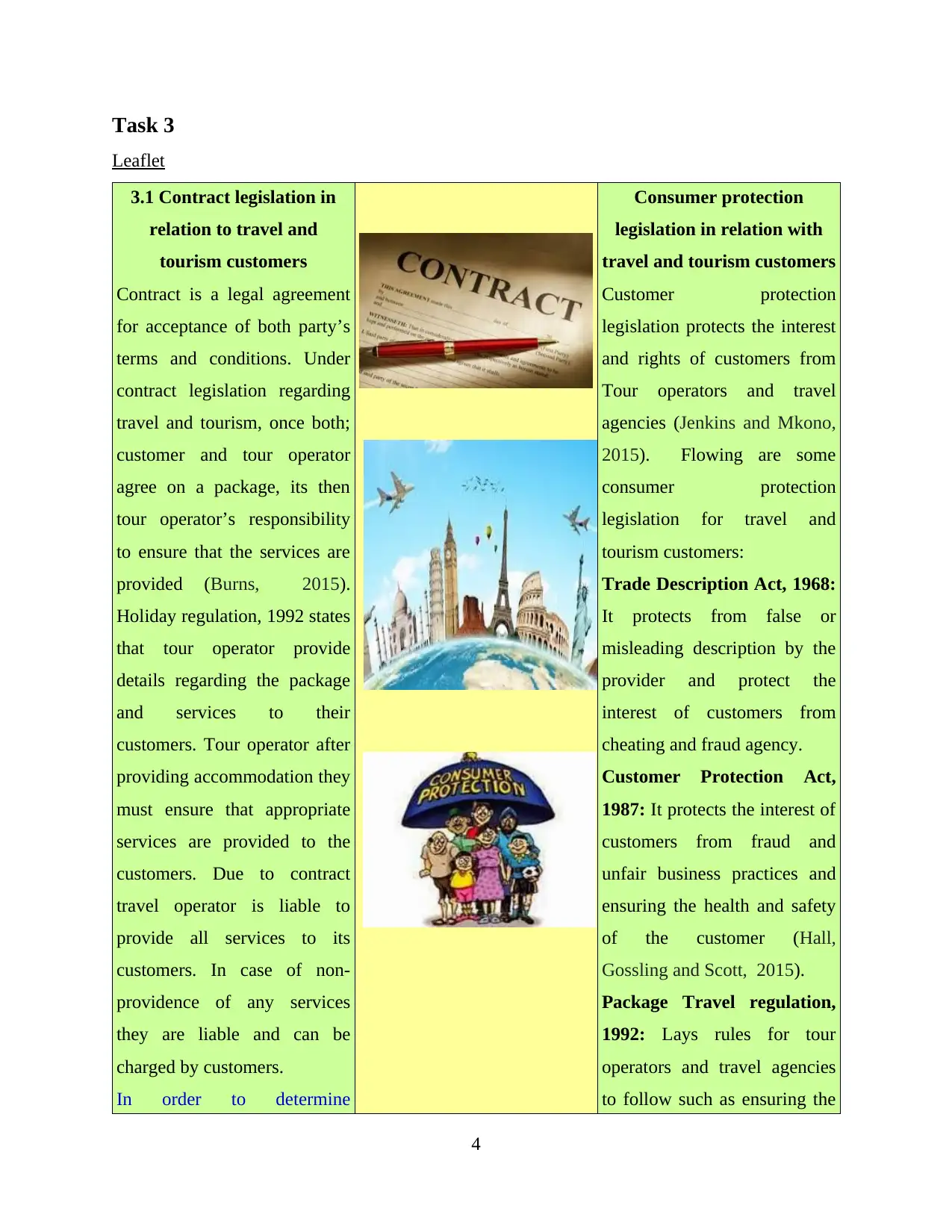
Task 3
Leaflet
3.1 Contract legislation in
relation to travel and
tourism customers
Contract is a legal agreement
for acceptance of both party’s
terms and conditions. Under
contract legislation regarding
travel and tourism, once both;
customer and tour operator
agree on a package, its then
tour operator’s responsibility
to ensure that the services are
provided (Burns, 2015).
Holiday regulation, 1992 states
that tour operator provide
details regarding the package
and services to their
customers. Tour operator after
providing accommodation they
must ensure that appropriate
services are provided to the
customers. Due to contract
travel operator is liable to
provide all services to its
customers. In case of non-
providence of any services
they are liable and can be
charged by customers.
In order to determine
Consumer protection
legislation in relation with
travel and tourism customers
Customer protection
legislation protects the interest
and rights of customers from
Tour operators and travel
agencies (Jenkins and Mkono,
2015). Flowing are some
consumer protection
legislation for travel and
tourism customers:
Trade Description Act, 1968:
It protects from false or
misleading description by the
provider and protect the
interest of customers from
cheating and fraud agency.
Customer Protection Act,
1987: It protects the interest of
customers from fraud and
unfair business practices and
ensuring the health and safety
of the customer (Hall,
Gossling and Scott, 2015).
Package Travel regulation,
1992: Lays rules for tour
operators and travel agencies
to follow such as ensuring the
4
Leaflet
3.1 Contract legislation in
relation to travel and
tourism customers
Contract is a legal agreement
for acceptance of both party’s
terms and conditions. Under
contract legislation regarding
travel and tourism, once both;
customer and tour operator
agree on a package, its then
tour operator’s responsibility
to ensure that the services are
provided (Burns, 2015).
Holiday regulation, 1992 states
that tour operator provide
details regarding the package
and services to their
customers. Tour operator after
providing accommodation they
must ensure that appropriate
services are provided to the
customers. Due to contract
travel operator is liable to
provide all services to its
customers. In case of non-
providence of any services
they are liable and can be
charged by customers.
In order to determine
Consumer protection
legislation in relation with
travel and tourism customers
Customer protection
legislation protects the interest
and rights of customers from
Tour operators and travel
agencies (Jenkins and Mkono,
2015). Flowing are some
consumer protection
legislation for travel and
tourism customers:
Trade Description Act, 1968:
It protects from false or
misleading description by the
provider and protect the
interest of customers from
cheating and fraud agency.
Customer Protection Act,
1987: It protects the interest of
customers from fraud and
unfair business practices and
ensuring the health and safety
of the customer (Hall,
Gossling and Scott, 2015).
Package Travel regulation,
1992: Lays rules for tour
operators and travel agencies
to follow such as ensuring the
4
⊘ This is a preview!⊘
Do you want full access?
Subscribe today to unlock all pages.

Trusted by 1+ million students worldwide
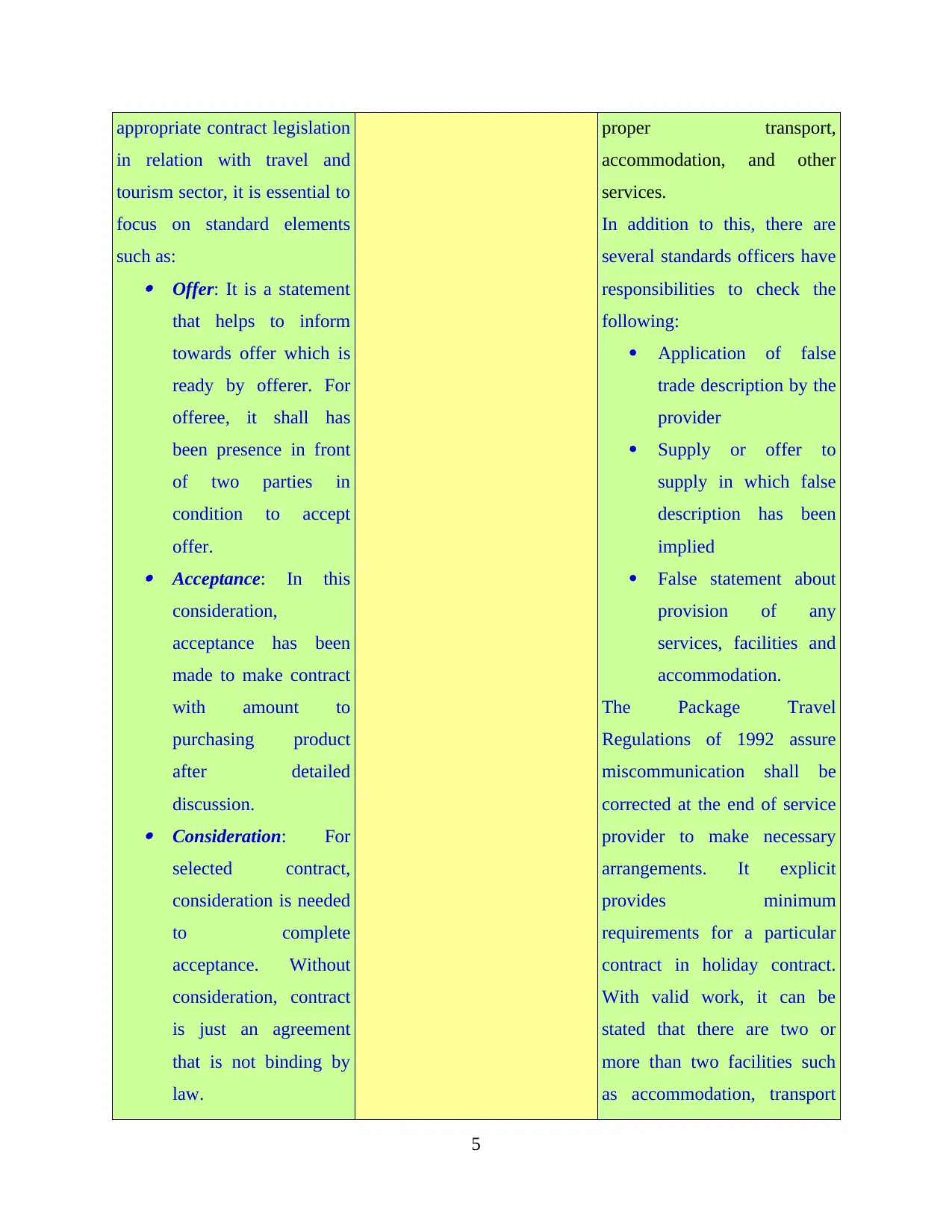
appropriate contract legislation
in relation with travel and
tourism sector, it is essential to
focus on standard elements
such as: Offer: It is a statement
that helps to inform
towards offer which is
ready by offerer. For
offeree, it shall has
been presence in front
of two parties in
condition to accept
offer. Acceptance: In this
consideration,
acceptance has been
made to make contract
with amount to
purchasing product
after detailed
discussion. Consideration: For
selected contract,
consideration is needed
to complete
acceptance. Without
consideration, contract
is just an agreement
that is not binding by
law.
proper transport,
accommodation, and other
services.
In addition to this, there are
several standards officers have
responsibilities to check the
following:
Application of false
trade description by the
provider
Supply or offer to
supply in which false
description has been
implied
False statement about
provision of any
services, facilities and
accommodation.
The Package Travel
Regulations of 1992 assure
miscommunication shall be
corrected at the end of service
provider to make necessary
arrangements. It explicit
provides minimum
requirements for a particular
contract in holiday contract.
With valid work, it can be
stated that there are two or
more than two facilities such
as accommodation, transport
5
in relation with travel and
tourism sector, it is essential to
focus on standard elements
such as: Offer: It is a statement
that helps to inform
towards offer which is
ready by offerer. For
offeree, it shall has
been presence in front
of two parties in
condition to accept
offer. Acceptance: In this
consideration,
acceptance has been
made to make contract
with amount to
purchasing product
after detailed
discussion. Consideration: For
selected contract,
consideration is needed
to complete
acceptance. Without
consideration, contract
is just an agreement
that is not binding by
law.
proper transport,
accommodation, and other
services.
In addition to this, there are
several standards officers have
responsibilities to check the
following:
Application of false
trade description by the
provider
Supply or offer to
supply in which false
description has been
implied
False statement about
provision of any
services, facilities and
accommodation.
The Package Travel
Regulations of 1992 assure
miscommunication shall be
corrected at the end of service
provider to make necessary
arrangements. It explicit
provides minimum
requirements for a particular
contract in holiday contract.
With valid work, it can be
stated that there are two or
more than two facilities such
as accommodation, transport
5
Paraphrase This Document
Need a fresh take? Get an instant paraphrase of this document with our AI Paraphraser
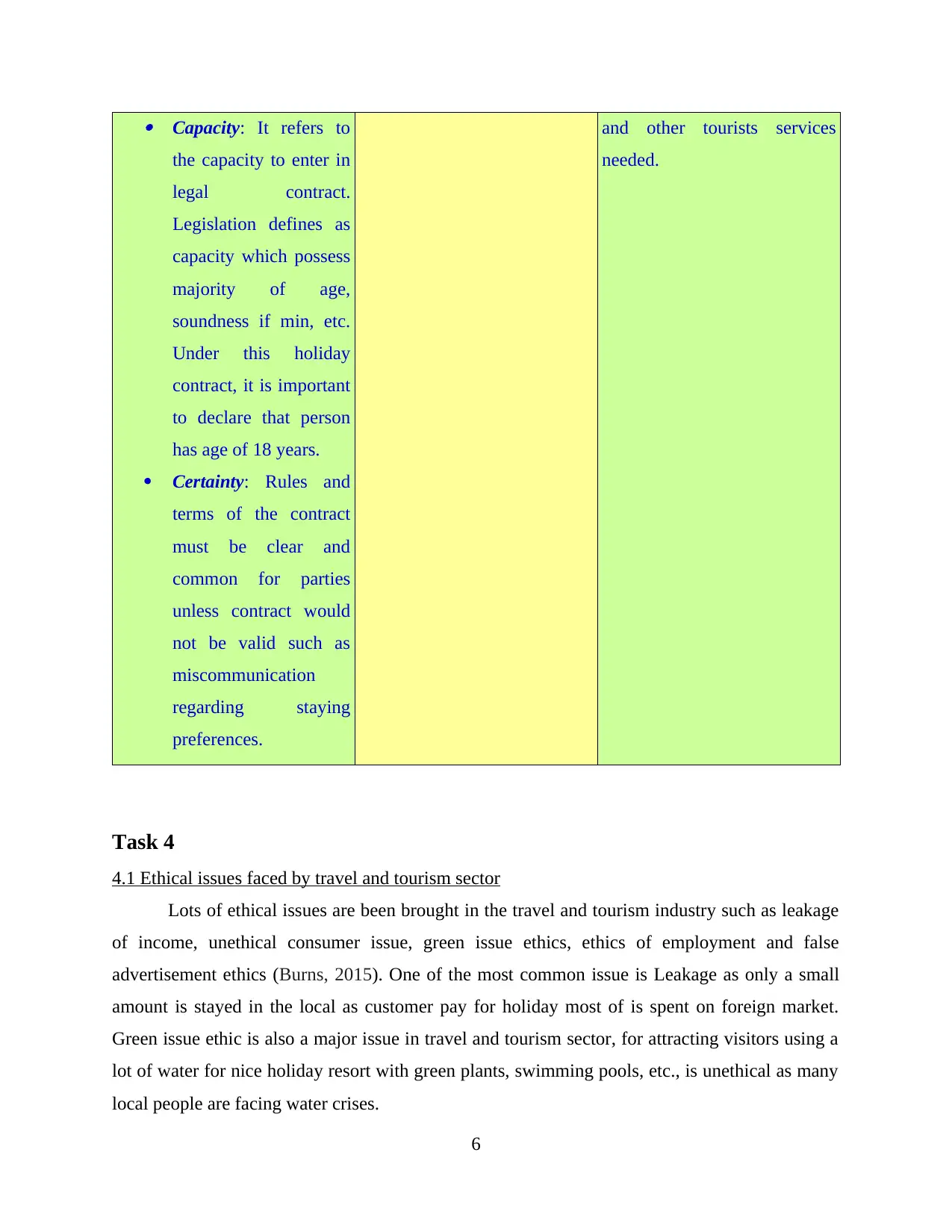
Capacity: It refers to
the capacity to enter in
legal contract.
Legislation defines as
capacity which possess
majority of age,
soundness if min, etc.
Under this holiday
contract, it is important
to declare that person
has age of 18 years.
Certainty: Rules and
terms of the contract
must be clear and
common for parties
unless contract would
not be valid such as
miscommunication
regarding staying
preferences.
and other tourists services
needed.
Task 4
4.1 Ethical issues faced by travel and tourism sector
Lots of ethical issues are been brought in the travel and tourism industry such as leakage
of income, unethical consumer issue, green issue ethics, ethics of employment and false
advertisement ethics (Burns, 2015). One of the most common issue is Leakage as only a small
amount is stayed in the local as customer pay for holiday most of is spent on foreign market.
Green issue ethic is also a major issue in travel and tourism sector, for attracting visitors using a
lot of water for nice holiday resort with green plants, swimming pools, etc., is unethical as many
local people are facing water crises.
6
the capacity to enter in
legal contract.
Legislation defines as
capacity which possess
majority of age,
soundness if min, etc.
Under this holiday
contract, it is important
to declare that person
has age of 18 years.
Certainty: Rules and
terms of the contract
must be clear and
common for parties
unless contract would
not be valid such as
miscommunication
regarding staying
preferences.
and other tourists services
needed.
Task 4
4.1 Ethical issues faced by travel and tourism sector
Lots of ethical issues are been brought in the travel and tourism industry such as leakage
of income, unethical consumer issue, green issue ethics, ethics of employment and false
advertisement ethics (Burns, 2015). One of the most common issue is Leakage as only a small
amount is stayed in the local as customer pay for holiday most of is spent on foreign market.
Green issue ethic is also a major issue in travel and tourism sector, for attracting visitors using a
lot of water for nice holiday resort with green plants, swimming pools, etc., is unethical as many
local people are facing water crises.
6
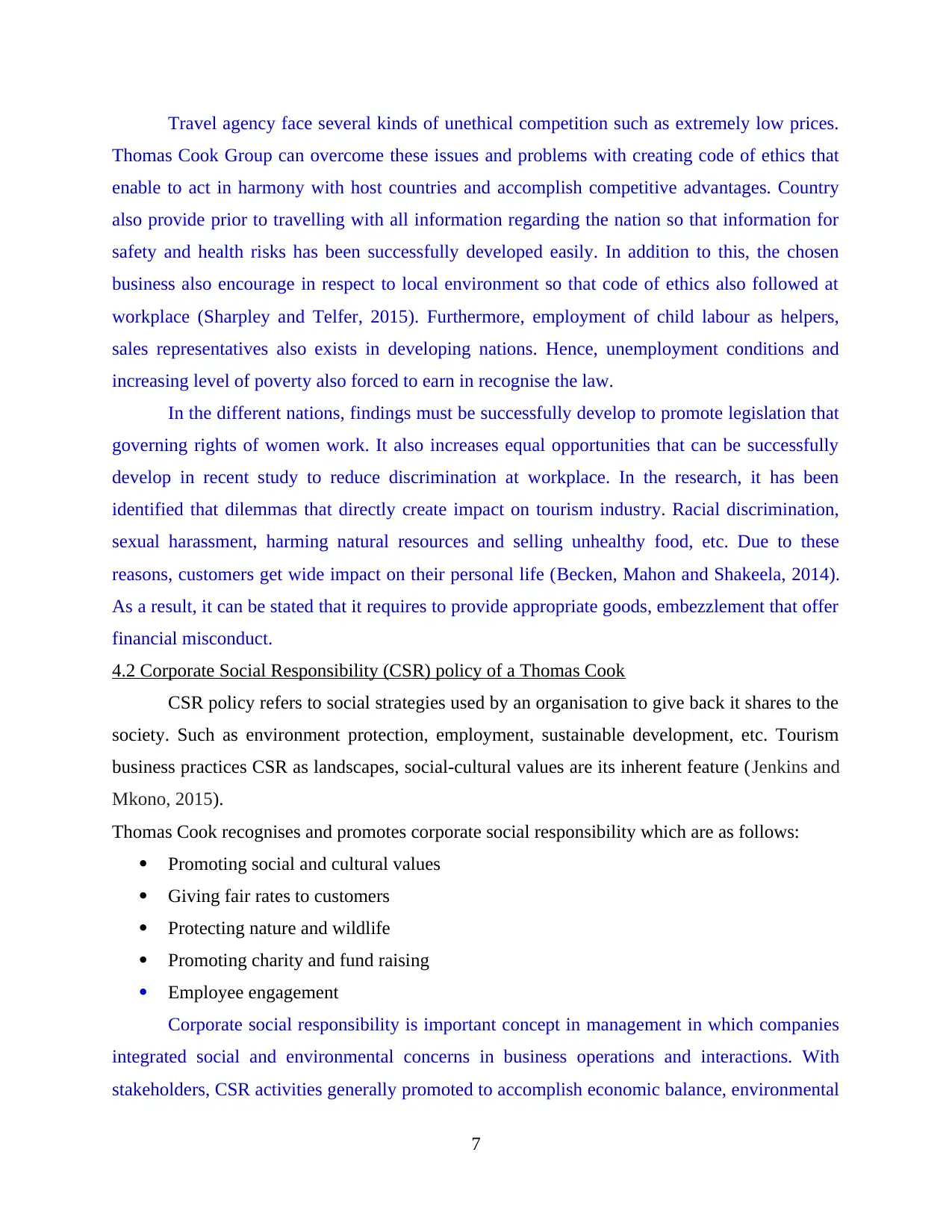
Travel agency face several kinds of unethical competition such as extremely low prices.
Thomas Cook Group can overcome these issues and problems with creating code of ethics that
enable to act in harmony with host countries and accomplish competitive advantages. Country
also provide prior to travelling with all information regarding the nation so that information for
safety and health risks has been successfully developed easily. In addition to this, the chosen
business also encourage in respect to local environment so that code of ethics also followed at
workplace (Sharpley and Telfer, 2015). Furthermore, employment of child labour as helpers,
sales representatives also exists in developing nations. Hence, unemployment conditions and
increasing level of poverty also forced to earn in recognise the law.
In the different nations, findings must be successfully develop to promote legislation that
governing rights of women work. It also increases equal opportunities that can be successfully
develop in recent study to reduce discrimination at workplace. In the research, it has been
identified that dilemmas that directly create impact on tourism industry. Racial discrimination,
sexual harassment, harming natural resources and selling unhealthy food, etc. Due to these
reasons, customers get wide impact on their personal life (Becken, Mahon and Shakeela, 2014).
As a result, it can be stated that it requires to provide appropriate goods, embezzlement that offer
financial misconduct.
4.2 Corporate Social Responsibility (CSR) policy of a Thomas Cook
CSR policy refers to social strategies used by an organisation to give back it shares to the
society. Such as environment protection, employment, sustainable development, etc. Tourism
business practices CSR as landscapes, social-cultural values are its inherent feature (Jenkins and
Mkono, 2015).
Thomas Cook recognises and promotes corporate social responsibility which are as follows:
Promoting social and cultural values
Giving fair rates to customers
Protecting nature and wildlife
Promoting charity and fund raising
Employee engagement
Corporate social responsibility is important concept in management in which companies
integrated social and environmental concerns in business operations and interactions. With
stakeholders, CSR activities generally promoted to accomplish economic balance, environmental
7
Thomas Cook Group can overcome these issues and problems with creating code of ethics that
enable to act in harmony with host countries and accomplish competitive advantages. Country
also provide prior to travelling with all information regarding the nation so that information for
safety and health risks has been successfully developed easily. In addition to this, the chosen
business also encourage in respect to local environment so that code of ethics also followed at
workplace (Sharpley and Telfer, 2015). Furthermore, employment of child labour as helpers,
sales representatives also exists in developing nations. Hence, unemployment conditions and
increasing level of poverty also forced to earn in recognise the law.
In the different nations, findings must be successfully develop to promote legislation that
governing rights of women work. It also increases equal opportunities that can be successfully
develop in recent study to reduce discrimination at workplace. In the research, it has been
identified that dilemmas that directly create impact on tourism industry. Racial discrimination,
sexual harassment, harming natural resources and selling unhealthy food, etc. Due to these
reasons, customers get wide impact on their personal life (Becken, Mahon and Shakeela, 2014).
As a result, it can be stated that it requires to provide appropriate goods, embezzlement that offer
financial misconduct.
4.2 Corporate Social Responsibility (CSR) policy of a Thomas Cook
CSR policy refers to social strategies used by an organisation to give back it shares to the
society. Such as environment protection, employment, sustainable development, etc. Tourism
business practices CSR as landscapes, social-cultural values are its inherent feature (Jenkins and
Mkono, 2015).
Thomas Cook recognises and promotes corporate social responsibility which are as follows:
Promoting social and cultural values
Giving fair rates to customers
Protecting nature and wildlife
Promoting charity and fund raising
Employee engagement
Corporate social responsibility is important concept in management in which companies
integrated social and environmental concerns in business operations and interactions. With
stakeholders, CSR activities generally promoted to accomplish economic balance, environmental
7
⊘ This is a preview!⊘
Do you want full access?
Subscribe today to unlock all pages.

Trusted by 1+ million students worldwide
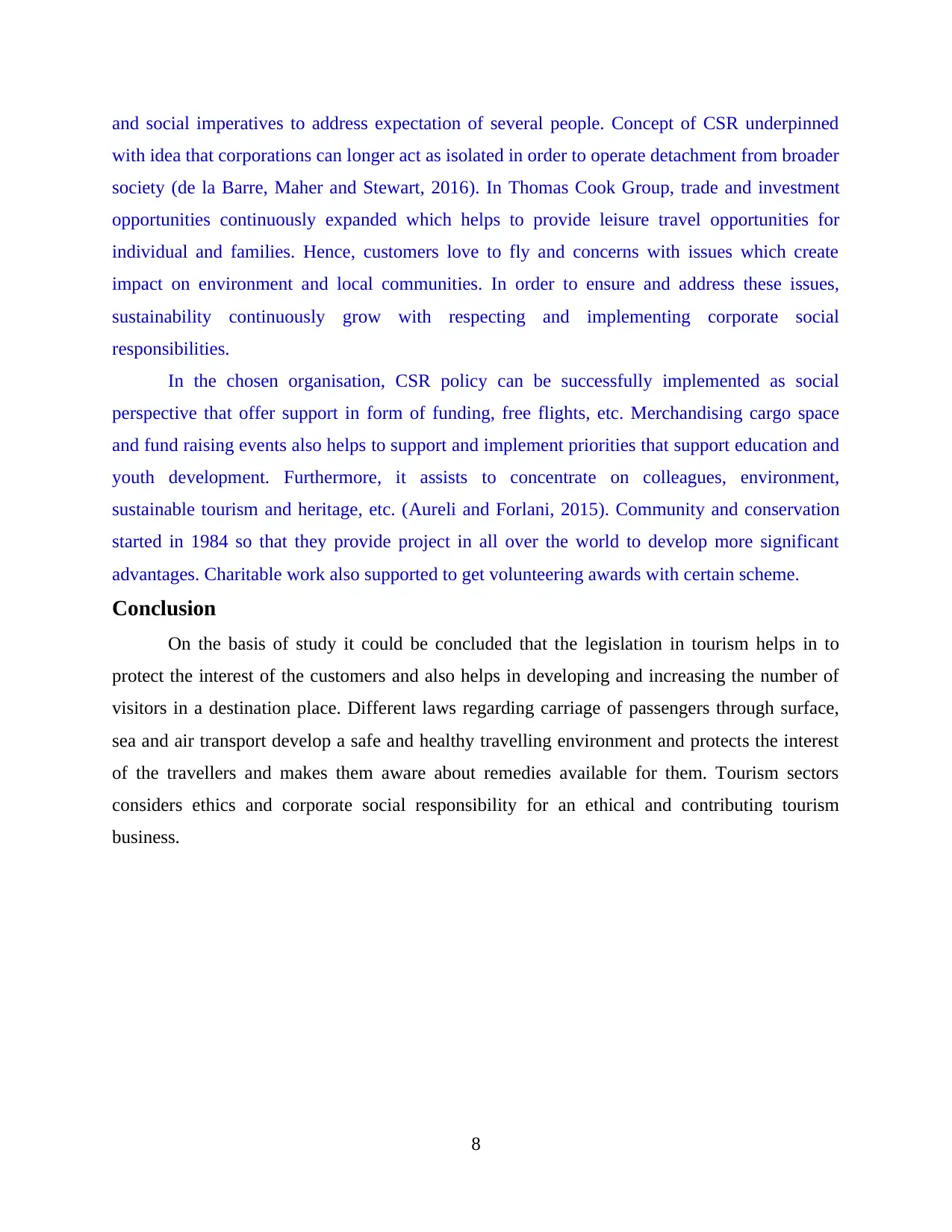
and social imperatives to address expectation of several people. Concept of CSR underpinned
with idea that corporations can longer act as isolated in order to operate detachment from broader
society (de la Barre, Maher and Stewart, 2016). In Thomas Cook Group, trade and investment
opportunities continuously expanded which helps to provide leisure travel opportunities for
individual and families. Hence, customers love to fly and concerns with issues which create
impact on environment and local communities. In order to ensure and address these issues,
sustainability continuously grow with respecting and implementing corporate social
responsibilities.
In the chosen organisation, CSR policy can be successfully implemented as social
perspective that offer support in form of funding, free flights, etc. Merchandising cargo space
and fund raising events also helps to support and implement priorities that support education and
youth development. Furthermore, it assists to concentrate on colleagues, environment,
sustainable tourism and heritage, etc. (Aureli and Forlani, 2015). Community and conservation
started in 1984 so that they provide project in all over the world to develop more significant
advantages. Charitable work also supported to get volunteering awards with certain scheme.
Conclusion
On the basis of study it could be concluded that the legislation in tourism helps in to
protect the interest of the customers and also helps in developing and increasing the number of
visitors in a destination place. Different laws regarding carriage of passengers through surface,
sea and air transport develop a safe and healthy travelling environment and protects the interest
of the travellers and makes them aware about remedies available for them. Tourism sectors
considers ethics and corporate social responsibility for an ethical and contributing tourism
business.
8
with idea that corporations can longer act as isolated in order to operate detachment from broader
society (de la Barre, Maher and Stewart, 2016). In Thomas Cook Group, trade and investment
opportunities continuously expanded which helps to provide leisure travel opportunities for
individual and families. Hence, customers love to fly and concerns with issues which create
impact on environment and local communities. In order to ensure and address these issues,
sustainability continuously grow with respecting and implementing corporate social
responsibilities.
In the chosen organisation, CSR policy can be successfully implemented as social
perspective that offer support in form of funding, free flights, etc. Merchandising cargo space
and fund raising events also helps to support and implement priorities that support education and
youth development. Furthermore, it assists to concentrate on colleagues, environment,
sustainable tourism and heritage, etc. (Aureli and Forlani, 2015). Community and conservation
started in 1984 so that they provide project in all over the world to develop more significant
advantages. Charitable work also supported to get volunteering awards with certain scheme.
Conclusion
On the basis of study it could be concluded that the legislation in tourism helps in to
protect the interest of the customers and also helps in developing and increasing the number of
visitors in a destination place. Different laws regarding carriage of passengers through surface,
sea and air transport develop a safe and healthy travelling environment and protects the interest
of the travellers and makes them aware about remedies available for them. Tourism sectors
considers ethics and corporate social responsibility for an ethical and contributing tourism
business.
8
Paraphrase This Document
Need a fresh take? Get an instant paraphrase of this document with our AI Paraphraser
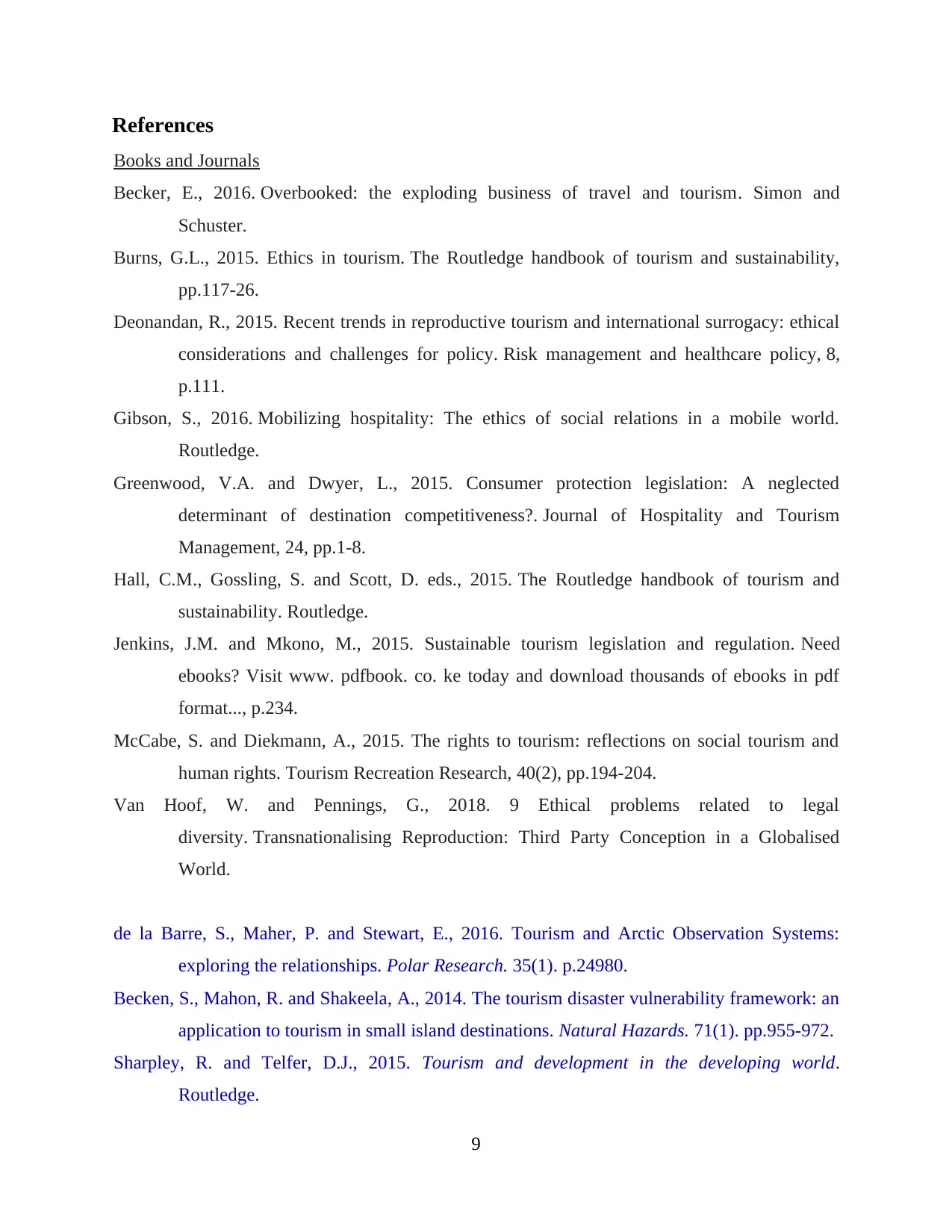
References
Books and Journals
Becker, E., 2016. Overbooked: the exploding business of travel and tourism. Simon and
Schuster.
Burns, G.L., 2015. Ethics in tourism. The Routledge handbook of tourism and sustainability,
pp.117-26.
Deonandan, R., 2015. Recent trends in reproductive tourism and international surrogacy: ethical
considerations and challenges for policy. Risk management and healthcare policy, 8,
p.111.
Gibson, S., 2016. Mobilizing hospitality: The ethics of social relations in a mobile world.
Routledge.
Greenwood, V.A. and Dwyer, L., 2015. Consumer protection legislation: A neglected
determinant of destination competitiveness?. Journal of Hospitality and Tourism
Management, 24, pp.1-8.
Hall, C.M., Gossling, S. and Scott, D. eds., 2015. The Routledge handbook of tourism and
sustainability. Routledge.
Jenkins, J.M. and Mkono, M., 2015. Sustainable tourism legislation and regulation. Need
ebooks? Visit www. pdfbook. co. ke today and download thousands of ebooks in pdf
format..., p.234.
McCabe, S. and Diekmann, A., 2015. The rights to tourism: reflections on social tourism and
human rights. Tourism Recreation Research, 40(2), pp.194-204.
Van Hoof, W. and Pennings, G., 2018. 9 Ethical problems related to legal
diversity. Transnationalising Reproduction: Third Party Conception in a Globalised
World.
de la Barre, S., Maher, P. and Stewart, E., 2016. Tourism and Arctic Observation Systems:
exploring the relationships. Polar Research. 35(1). p.24980.
Becken, S., Mahon, R. and Shakeela, A., 2014. The tourism disaster vulnerability framework: an
application to tourism in small island destinations. Natural Hazards. 71(1). pp.955-972.
Sharpley, R. and Telfer, D.J., 2015. Tourism and development in the developing world.
Routledge.
9
Books and Journals
Becker, E., 2016. Overbooked: the exploding business of travel and tourism. Simon and
Schuster.
Burns, G.L., 2015. Ethics in tourism. The Routledge handbook of tourism and sustainability,
pp.117-26.
Deonandan, R., 2015. Recent trends in reproductive tourism and international surrogacy: ethical
considerations and challenges for policy. Risk management and healthcare policy, 8,
p.111.
Gibson, S., 2016. Mobilizing hospitality: The ethics of social relations in a mobile world.
Routledge.
Greenwood, V.A. and Dwyer, L., 2015. Consumer protection legislation: A neglected
determinant of destination competitiveness?. Journal of Hospitality and Tourism
Management, 24, pp.1-8.
Hall, C.M., Gossling, S. and Scott, D. eds., 2015. The Routledge handbook of tourism and
sustainability. Routledge.
Jenkins, J.M. and Mkono, M., 2015. Sustainable tourism legislation and regulation. Need
ebooks? Visit www. pdfbook. co. ke today and download thousands of ebooks in pdf
format..., p.234.
McCabe, S. and Diekmann, A., 2015. The rights to tourism: reflections on social tourism and
human rights. Tourism Recreation Research, 40(2), pp.194-204.
Van Hoof, W. and Pennings, G., 2018. 9 Ethical problems related to legal
diversity. Transnationalising Reproduction: Third Party Conception in a Globalised
World.
de la Barre, S., Maher, P. and Stewart, E., 2016. Tourism and Arctic Observation Systems:
exploring the relationships. Polar Research. 35(1). p.24980.
Becken, S., Mahon, R. and Shakeela, A., 2014. The tourism disaster vulnerability framework: an
application to tourism in small island destinations. Natural Hazards. 71(1). pp.955-972.
Sharpley, R. and Telfer, D.J., 2015. Tourism and development in the developing world.
Routledge.
9
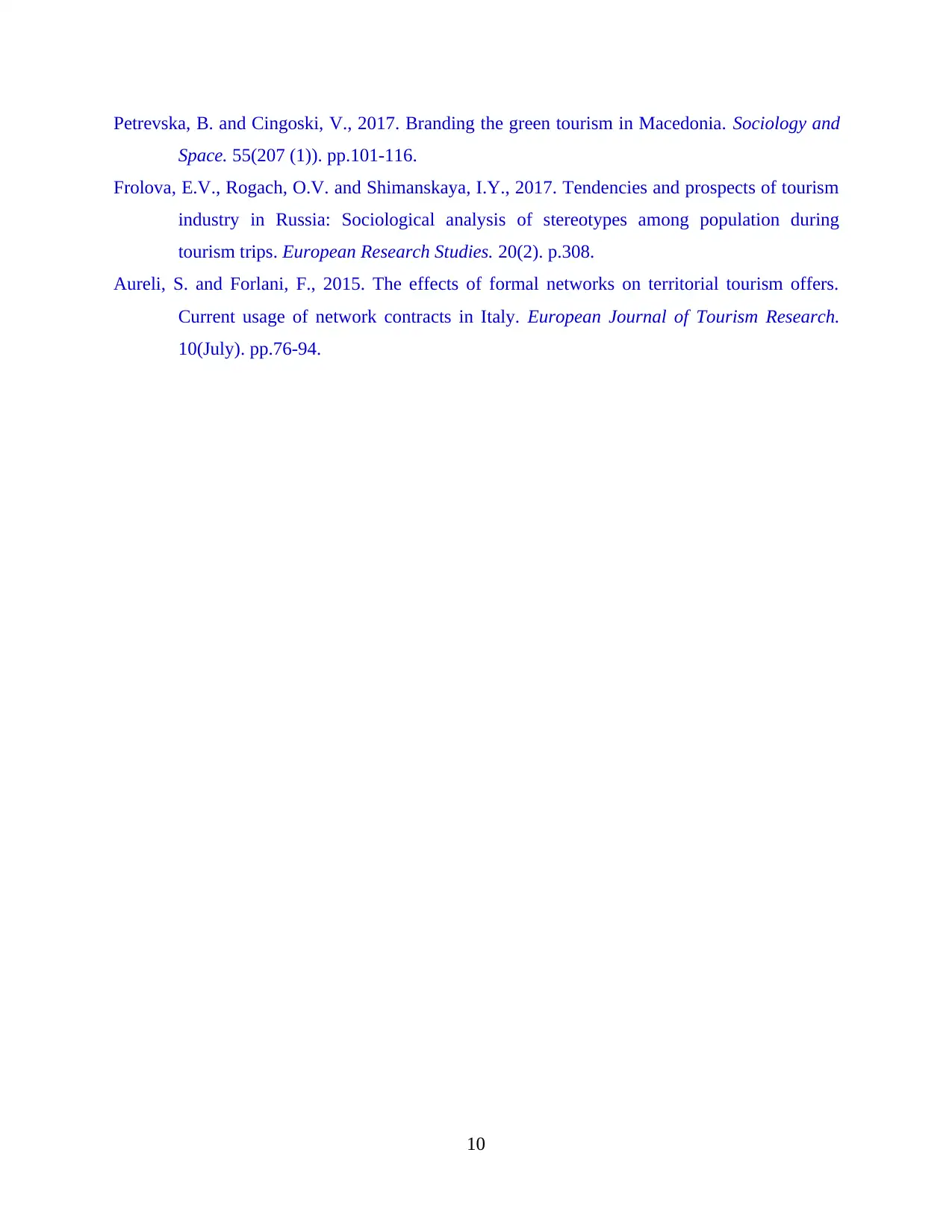
Petrevska, B. and Cingoski, V., 2017. Branding the green tourism in Macedonia. Sociology and
Space. 55(207 (1)). pp.101-116.
Frolova, E.V., Rogach, O.V. and Shimanskaya, I.Y., 2017. Tendencies and prospects of tourism
industry in Russia: Sociological analysis of stereotypes among population during
tourism trips. European Research Studies. 20(2). p.308.
Aureli, S. and Forlani, F., 2015. The effects of formal networks on territorial tourism offers.
Current usage of network contracts in Italy. European Journal of Tourism Research.
10(July). pp.76-94.
10
Space. 55(207 (1)). pp.101-116.
Frolova, E.V., Rogach, O.V. and Shimanskaya, I.Y., 2017. Tendencies and prospects of tourism
industry in Russia: Sociological analysis of stereotypes among population during
tourism trips. European Research Studies. 20(2). p.308.
Aureli, S. and Forlani, F., 2015. The effects of formal networks on territorial tourism offers.
Current usage of network contracts in Italy. European Journal of Tourism Research.
10(July). pp.76-94.
10
⊘ This is a preview!⊘
Do you want full access?
Subscribe today to unlock all pages.

Trusted by 1+ million students worldwide
1 out of 12
Related Documents
Your All-in-One AI-Powered Toolkit for Academic Success.
+13062052269
info@desklib.com
Available 24*7 on WhatsApp / Email
![[object Object]](/_next/static/media/star-bottom.7253800d.svg)
Unlock your academic potential
Copyright © 2020–2026 A2Z Services. All Rights Reserved. Developed and managed by ZUCOL.





